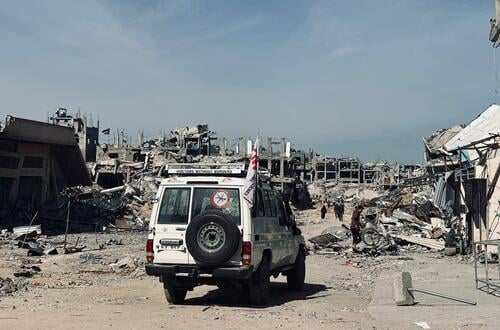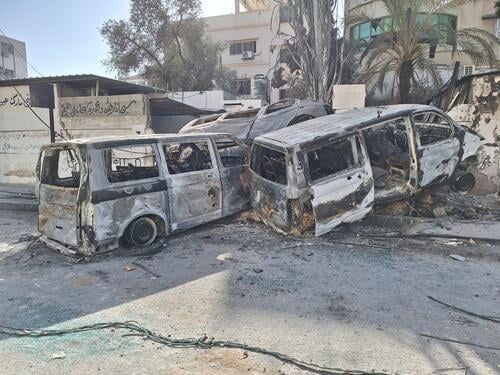Info on response and situation last updated: 4 April 2025.
Social media updates last updated: 8 April 2025.
Decades of repression and conflict, and an Israel-imposed blockade from 2007 on the Gaza Strip, Palestine, exploded on 7 October 2023 when Hamas attacked Israel on a large scale. In response, Israel launched massive attacks on Gaza.
Since 7 October 2023, more than 50,000 Palestinians have been killed and 113,000 injured, according to Gaza’s Ministry of Health. Not a single hospital in the Gaza Strip is fully functional. This lack of essential infrastructure and daily bombardments are now coupled with a total blockade on aid imposed by Israel on 2 March. Without any trucks entering Gaza, people are now entirely deprived of basic necessities; there is no electricity, limited access to water, and medicines are running out.
The temporary ceasefire that brought relief from 19 January until 18 March must be reinstated. A permanent and sustained ceasefire remains the only solution to ease the suffering of Palestinians.
Between 7 October 2023 and 15 March 2025, MSF teams in Gaza have provided
680,000
680,
187,800
187,8
40,500
40,5
35,700
35,7
18,600
18,6
10,900
10,9
MSF response in Gaza and the West Bank
MSF currently operates in two hospitals (Al-Aqsa hospital, Nasser hospital), one field hospital, six basic healthcare centres, and two clinics.
Our teams are offering surgical support, wound care, physiotherapy, maternity and paediatric care, basic healthcare, vaccinations, and mental health services. However, Israel’s blockade on Gaza has left hospitals without sufficient supplies despite the massive scale up of services and assistance that is needed.
South Gaza
Nasser hospital, Khan Younis - Nasser hospital has one of the sole functional maternity wards in Gaza. Working with the Ministry of Health, we focus on providing orthopaedic surgery, and working in the burn unit, providing plastic surgery, general laboratory activities, physiotherapy and supporting the counselling department. We also offer day surgery and use 3D printing for patients to create masks for patients with severe facial burns.
Al-Mawasi healthcare centre, Rafah – We provide outpatient services, including general consultations, vaccinations, reproductive healthcare, wound dressing, mental health services, and health promotion. Our facility also features a 24/7 emergency room for stabilising and referring trauma patients. We are also providing malnutrition screening and outpatient treatment for malnutrition for children and pregnant and lactating women.
Khan Younis healthcare centre, Khan Younis - We provide outpatient consultations, vaccinations, mental health services, outpatient treatment for malnutrition, sexual and reproductive healthcare, wound care, physiotherapy, and health promotion. We also provide a minimal emergency service focused on stabilisation and referral.
Al-Attar healthcare centre, Khan Younis – Since 18 March, we have had to reduce our capacity in Al-Attar healthcare centre, working half a day every day to offer a range of services, including general medicine, paediatric consultations, emergency healthcare, wound care, antenatal and postnatal care, malnutrition treatment, mental healthcare, and health promotion. A 24-hour emergency service remains available at the centre.
Al-Qarara sexual and reproductive health clinic, Khan Younis – We provide medications and financial support to a clinic run by PalMed, a local organisation, which covers sexual and reproductive healthcare, as well as provide general medical consultations and outpatient treatment for malnutrition.
Middle Area
Al-Aqsa hospital, Deir Al-Balah – We support the Ministry of Health with trauma surgery, advanced wound care, post-operative wound care, physiotherapy, health promotion, and mental health support. We also provide malnutrition screenings and referrals.
Al-Hekker clinic, Deir Al-Balah – Since 18 March, we have had to reduce capacity and now only work half a day every day in Al-Hekker clinic. We provide general consultations, vaccinations, reproductive health services, and wound dressings. We also provide mental health services, including psychological first aid, individual and family counselling sessions, and psychoeducation and health promotion activities. Our services include outpatient treatment for malnutrition.
Deir Al-Balah field hospital, Deir Al-Balah – Located 250 metres from Al-Aqsa hospital, we run this field hospital to provide extra capacity and support to Al-Aqsa. We treat people on an outpatient basis in an emergency room and an outpatient department, and people on an inpatient basis, with capacity for 70 beds, for those who need to be admitted or require surgery in the operating theatre.
North Gaza
MSF clinic (near Al-Shifa hospital), Gaza City – In our clinic close to Al-Shifa hospital, our team provides general consultations, screening for non-communicable diseases and malnutrition, as well as antenatal and postnatal care. Since 18 March, we are increasing the capacity for wound care and physiotherapy to meet the needs of newly injured people. We are also 3D printing masks for people with severe facial burns.
Sheikh Radwan healthcare centre, Gaza City – We are training Ministry of Health staff on nutrition and emergency care in the centre, as well as donating supplies.
Water and sanitation
Between January and mid-March, we produced over 2 million litres of clean water and distributed over 36 million litres. We continuously work to increase the quantity of drinkable water in the Gaza Strip.
In partnership with a local organisation, Palestinian Agriculture and Development Association (PARC), we are building latrines, distributing hygiene kits, and supporting water treatment units in camp shelters in Deir Al-Balah and Khan Younis.
In the West Bank, we are maintaining activities focused on emergency care, basic healthcare via mobile clinics, and mental healthcare in Hebron, Nablus, Tulkarem, and Jenin.
Hebron
In Hebron district, we provide medical care through 15 mobile clinics. With medical staff, we also support the maternity and emergency wards in Halhul hospital. We deliver mental health services, donations to hospitals, and first-aid kits to communities. We also provide social work case management for communities affected by settlers’ attacks, including in Hebron’s Old City, Dura, and Masafer Yatta. MSF also runs community activities in Umm Qussa, Al Majaz, Umm Al Kheir and in H2 neighbourhood of the Hebron city.
Nablus
In Nablus district, we provide psychological first aid, psychiatric care, and sexual and reproductive healthcare. We have trained volunteers from the Palestine Red Crescent Society as first aid responders in Nablus, Tubas, and Qalqilya. We’re also providing basic healthcare through a mobile clinic.
We are training local psychologists and medical and paramedical volunteers for the Palestinian Red Crescent.
Jenin and Tulkarem
MSF runs daily mobile clinics covering 30 locations across Jenin and Tulkarem. We are also supporting three clinics with treatment of chronic conditions like diabetes and hypertension, mental health services, and treatment of respiratory infections. MSF teams distribute hygiene kits, food parcels, bedding, and water heaters. We are also supplying Khalil Suleiman hospital in Jenin with water.
- An immediate restoration of the ceasefire.
- World leaders and organisations to refrain from normalising Israel’s withholding of aid to Gaza by acting decisively to end the blockade and exert their influence in favour of a permanent and sustained ceasefire.
- Israel to lift the blockade to allow unhindered and continuous humanitarian supplies like medicine, medical equipment, food, fuel and water to enter Gaza.
- Basic guarantees of safety to enable our teams to move to provide humanitarian and medical services.
- Access to people in need of medical care and humanitarian aid, including the sick and wounded.
- People to be afforded safe access to essential supplies like food and water and health facilities.
- Those who wish to leave must be able to do so safely without prejudicing their future option to come back.
- In the West Bank, for Israeli authorities to put an end to the violence and forced displacements of Palestinians.
- Israeli authorities must stop implementing restrictive measures in the West Bank that impede the ability of Palestinians to access basic services, including medical care.
We call all on States, in particular the US, UK, and allied EU Member States, to do everything in their power to influence Israel to adopt a permanent ceasefire in Gaza.
Situation in Palestine
The situation in Gaza has been described by our teams as ‘apocalyptic’.
Since 18 Match, Israeli forces have again begun carrying out widespread attacks that disproportionately impact civilians. Palestinians in Gaza are once more suffering each day from Israel’s all-out military campaign, which is now accompanied by the misery of a total blockade and cut electricity.
Gaza City and the North governorate of Gaza are almost completely destroyed, with no available essential services. Over half a million people have returned to the north of Gaza since the initial ceasefire, returning to neighbourhoods and homes that have been reduced to ashes. Hospitals have been razed. People are settling on the rubble of their homes with no other shelter. There is a worrying lack of health structures, water, and other essential services. People are being pushed further into a state of total desperation.
The Israeli forces have dismantled the health system and have left people without, or with very difficult, access to medical care. Out of 36 hospitals in Gaza, 21 are partially functional. As it stands, the very few hospitals and medical facilities that remain operational cannot cope with the vast medical needs. Staff and patients from MSF had to leave 17 different health facilities and endured 41 violent incidents during the war. Eleven MSF staff have been killed.
The situation is worsening in the West Bank, with increased settler violence and Israeli incursions, particularly in Jenin, Tulkarem and Tubas. This is causing immense suffering and severe obstruction to the provision of healthcare.
A military operation called “Iron wall” was launched by Israel on 21 January and has killed at least 50 Palestinians as of 2 February, according to Israeli Forces. It has forcibly displaced 20,000 residents in Jenin and more than 12,000 in Tulkarem, as well as severely damaged an estimated 150-180 homes, according to OCHA.
People lack water, fuel and electricity. MSF is committed to staying and supporting residents, despite the restrictions on movement caused by insecurity.
Severe movement restrictions imposed by Israeli forces across the West Bank are making every journey complicated, whether to go to work, visit relatives, or seek medical care. Moving in the West Bank is characterised by road closures, prolonged delays at checkpoints, and the installation of new gates at village entrances.
Featured
Social media updates
On our social media accounts we have posted statements and testimonies from Gaza directly after mass casualty events, attacks on hospitals, and evacuation orders. This is a selection of statements and testimonies posted to our @MSF account on X, formerly Twitter.
Latest articles on Gaza-Israel war
- Try a different country, year, format, or topic.
- Clear one or more filters




